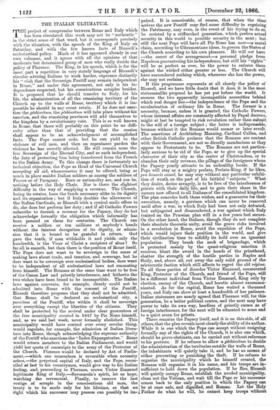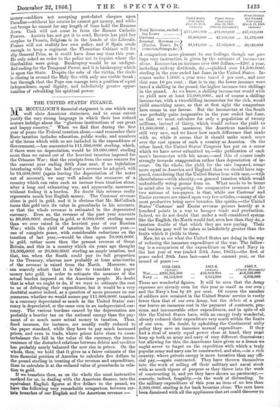THE ITALIAN ULTIMATUM.
THE project of compromise between Rome and Italy which has been circulated this week may not be " authentic " in the strict sense of that word, but it corresponds precisely with the situation, with the speech of the King of Italy on- Saturday, and with the few known facts of Ricasoli's ecclesiastical policy. Much of it has appeared already in our own columns, and it agrees with all the opinions of that moderate but determined group of men who really decide the policy of Florence. The King, in his speech, which is for the most part a repetition in very stately language of Rieasoli's circular advising Italians to work harder, expresses distinctly his " wish that the Sovereign Pontiff may remain independent in Rome," and under this agreement, not only is his in- dependence respected, but his conscientious scruples besides. It is proposed that he should transfer to Italy, for his life, the administration of all the remaining territory of the Church up to the walls of Rome, territory which it is im- possible he should in any event retain. If he does not sanc- tion the plebisciturn, the plebiscitton will take place without his sanction, and the remaining provinces will add themselves to the kingdom by a revolutionary vote. This is so well known in Rome, that there will probably on this point be no diffi- culty other than that of providing that the cession shall appear to be an acknowledgment of accomplished facts. The Pope cannot cede, but he can yield to the violence of evil men, and then on repentance pardon the violence he has secretly allowed. He will remain none the less Sovereign of the Eternal City, and as such independent, the duty of protecting him being transferred from the French to the Italian Army. To this change there is fortunately no technical objection, the Pope as• Head of the Universal Church accepting all aid, whencesoever it may be offered, being as much in place amidst Italian soldiers as among the soldiers of France or of Paraguay. Race or nationality are, and can be, nothing before the Holy Chair. Nor is there the slightest difficulty in the way of supplying a revenue. The Church, losing its estates, loses the funds necessary alike to its dignity and its organization ; bat if Italy doubles the allowances of the Italian Cardinals, as Ricasoli with a cynical smile offers to do, she does but perform her duty; and if all Catholic Powers subscribe to furnish a revenue for the Papacy, they do but acknowledge formally the obligation which informally has been pressed on them for centuries. The Church can receive a million or ten millions at anybody's hands without the faintest derogation of its dignity, or admis- sion that it is bound to be grateful in return. God gave the tenth, if man withholds it and yields _ only the hundredth, is the Vicar of Christ a recipient of alms ? So far all ia smooth, but then there is the position of Rome itself. The Pope does not want to be sovereign in the sense of making laws about trade, and taxation, and- sewerage, but he does want to be sovereign over ecclesiastical bodies, does want to be independent of all ecclesiastical laws not emanating from himself. The Romans at the same time want to be free of the Canon Law and priestly interference, and hitherto the two wishes have been found to be incompatible. The Italian • laws against convents, for example, clearly could not be admitted into Rome with the consent of the Pontiff, Ricasoli therefore proposes that they shall not be admitted, that Rome shall be declared an ecclesiastical city, a peculium of the Pontiff, who within it shall be sovereign
over everything except the liberties of the citizens. They shall be protected by the revival under clear guarantees of the free municipality created in 1847 by Pio Nono himself, and, as we said last week, never formally abolished. This municipality would have control over every secular thing, would regulate, for example, the admission of Italian litera- ture into Rome, though acknowledging the supreme authority of the Pontiff who sanctions the "Index Expurgatorius." Rome would return members to the Italian Parliament, and would yield her quota of conscripts to the army of the Protector of the Church. Florence would be declared by Act of Parlia- ment,—which one remembers is reversible when necessity arises,—the perpetual capital of Italy, and the Pope, recon- ciled at last to his countrymen, would give way to his Italian feeling, and, proceeding to Florence, crown Victor Emanuel legitimate King of Italy,—Savonarola's spirit, let us hope, watching the ceremonial. Finally, to remove the last vestige of scruple in the conscientious old man, the treaty is to be made only for his lifetime, so that no right which his successor may possess can possibly be inise
paired. It is conceivable, of course, that when the time• arrives the new Pontiff may find some difficulty in regaining the Patrimony, may even, in the event of his trying to do so, be resisted by a stiffnecked generation, which prefers actual security in this world to possible security in the next ; but still the next Pope will have all Pio Nono has now—a moral claim, according to Ultramontane ideas, to govern the States of the Church according to his own pleasure. He will not have
—the secret of the arrangement—a personal pledge from Napoleon guaranteeing his independence, but still his "rights" will be as perfect as ever, be the power to enforce them against the wicked either greater or less. The Church will have surrendered nothing which, whenever she has the power, she may not reclaim.
If this programme represents at all closely the policy of Ricasoli, and we have little doubt that it does, it is the most statesmanlike proposal he has yet put before the world. It secures the two apparently incompatible necessities behind which real danger lies—the independence of the Pope and the secularization of ordinary life in Rome. The former is a necessity, because, unless it is granted, the Catholic Powers, whose internal affair' 'IL:are constantly affected by Papal decrees, might at last be tempted to risk revolution rather than submit to the will of a foreign subject ; the latter is indispensable, because without it the Romans would sooner or later revolt.
The assertions of Archbishop Manning, Cardinal Cullen, and other British Catholic prelates that the Romans are content with their Government, are not so directly mendacious as they appear to Protestants to be. The Romans are not partica- larly anxious to be rid of the Pope, or to give up the special character of their city as the centre of Christendom, or to abandon their-only revenue, the pillage of the foreigners whom the Papacy yearly attracts to an unhealthy locale. If the Pope will stay as a mighty prelate, Prelate-King, if he likes,
pro honoris causd, he may stay without any particular exhibi-
tion of wrath on the part of his faithful "subjects." What they desire, desire savagely, is to be free of the interference of priests with their daily life, and -to gain their share in the
careers now offered to all Italians of the consolidated kingdom.. The plan concedes both these wishes, and a guarantee for their
execution, namely, a garrison which can never be removed until after a war, in which Italy had been not only defeated, but subjugated and dismembered, a war against which Italy trained on. the Prussian plan will in a few years feel secure.
On the other hand, the. Italians, though they do not complete their absolute theoretic unity, avoid the grave risks involved in a revolution in Rome, avoid the expulsion of the Pope, which would injure their position in the world, and give their civilization time to solidify its hold over an ignorant
population. They break the neck of brigandage, which is protected mainly by the quasi-religious sanction it receives, blunt the sword in the hands of the priesthood, shatter the strength of the hostile parties in Naples and Sicily, and, above all, cut away the only solid ground of the- aristocratic faction which still affects to regret the old regime.
To all these parties of disorder Victor Emanuel, consecrated King, Protector of the Church, and friend of the Pope, will
be a different individual from Victor Emanuel, King only by election, enemy of the Church, and heretic almost excommu- nicated. As for the capital, Rome has waited a thousand years,. and Italy can show at least a hundredth of her patience. Italian statesmen are nearly agreed that Florence will, for this- generation, be a better political centre, and the next may have power to take its own way, heedless of priestly curses as of foreign interference, for the next will be educated to arms and to a quiet scorn for. priests.
There remains the Papacy itself, and it is on this side, of all others, that the plan reveals most clearly the ability of its author.. While it is one which the Pope can accept without resigning formally any of the rights of the Church, it is also one which, should he prove obstinate, can be carried out without reference- to his protests. If he refuses to allow a piebisciturn to decide the administration of the territories outside the walls of Rome, the inhabitants will quietly take it, and he has no means of either preventing or punishing the theft. If he refuses to organize the municipality which he himself created, the Romans will organize it in his name, and his troops are in- sufficient to hold down the population. If he flies, Ricasoli will quietly occupy Rome, establish the needed municipality, clean out the Vatican, and wait till the Pope or his successor comes back to the only position in which the Papacy can be at once safe, and dignified, and Roman. Let the Holy Father do what he will, he cannot keep troops without money—soldiers not accepting post-dated cheques upon Paradise—without his estates he cannot get money, and with- out 'troops he cannot for any length of time hold the Romans down. Cash will not come in from the Roman Catholic Powers. Austria has not got it to send, Bavaria has paid her surplus to Prussia, Belgium is in the hands of the Liberals, France will not stultify her own policy, and if Spain sends enough to keep a regiment the Florentine Cabinet will let slip General Prim, as it could have done any time this year. He only asked an order to the police not to inquire where the Garibaldini were going. Bankruptcy would be an undigni- fied ending for the Temporal Power, and it is bankruptcy which is upon the State. Despite the sobs of the victim, the circle is closing in around the Holy See with only one visible break ; but through that the. Pope can emerge into a position of equal independence, equal dignity, and indefinitely greater oppor- tunities of rebuilding his spiritual power.



































 Previous page
Previous page